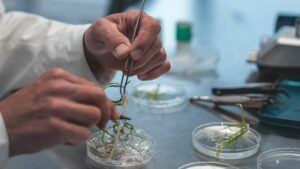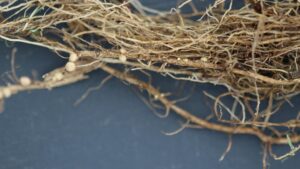People News
Bayer CropScience has announced that Inci Dannenberg has been named vice president of commercial operations for crop protection for the United States. Dannenberg succeeds Jim Delong, who retired from Bayer CropScience at the end of 2011. As vice president of commercial operations, Dannenberg will lead the sales force and operations for the United States, including two sales regions, customer service, key accounts and business operations. Prior to this role, Dannenberg served as the Midwest regional director for eight key agricultural states.
The Samuel Roberts Noble Foundation board of trustees has selected Bill Buckner as the organization’s new president and CEO. Buckner, who began his tenure on January 16, 2012, most recently served as president and CEO of Bayer CropScience and has more than 30 years of experience within various agricultural industries. Buckner is the eighth president in the Noble Foundation’s 66-year history. He replaced Michael Cawley, who is retiring after two decades of leading the Ardmore, Okla.-based foundation.
Limagrain Cereal Seeds has hired industry sales and marketing specialist Ken McClintock as the company’s regional sales manager, leading the brand strategy for Limagrain’s eastern United States region in wheat seeds sales. McClintock was most recently employed at Dairyland Seeds as a sales representative for Bio-Plant Research, where he was instrumental in developing the company’s wheat marketing program.
Sakata Seed America has appointed Alecia Troy as senior marketing manager for vegetables. Troy will lead all aspects of vegetable marketing communications for North America, Central America and Mexico. Formerly, Troy has served as a senior marketing communications manager at Goldsmith Seeds as well as Syngenta Flowers. Troy will be based at Sakata Seed America’s headquarters in Morgan Hill, Calif.
Valent U.S.A. Corporation has hired Andy Lee as its new executive vice president and chief operating officer. Lee assumed his new role on December 12, 2011. In his new position, Lee oversees day-to-day operations for the company’s growing agricultural, professional and consumer products business units in the United States, Canada and Mexico. Lee is based in Walnut Creek, Calif., working closely with the Valent de Mexico and Valent U.S.A. leadership teams. Lee most recently served as chief executive officer of Sipcam Agro USA Inc., and ADVAN LLC.
Rita Mumm, associate professor of quantitative genetics and plant breeding at the University of Illinois, will join the UC Davis Plant Breeding Academy team of core instructors for the 2012 class. Mumm, who was a pioneer in developing and releasing some of the first transgenic traits in crops with the Dekalb Genetics Corporation, brings over 18 years of experience in the plant breeding industry to the role. Her current research focuses on maize quantitative genetics, applications of genomic information to the development of improved hybrids and deployment of traits created through genetic engineering, including efficient breeding strategies and stewardship of government-regulated materials. The UC Davis Plant Breeding Academy 2012 Class begins in September and will include new topics that reflect the most recent developments in plant breeding theory and practice.
Product News
XiteBio Technologies Inc. has announced the development and commercial release of XiteBio SoyRhizo soybean inoculant this spring for the United States market. XiteBio SoyRhizo is the first of its kind—a commercial soybean inoculant that uses Advanced Growth Promoting Technology. The AGPT developed by the researchers at XiteBio not only introduces an optimum number of nitrogen-fixing bradyrhizobium into the soil, but also invigorates natural soil microflora, including the native rhizobia, and creates synergy between them. SoyRhizo is an all-in-one package that is easy to apply on-seed or in-furrow, and boosts soybean growth and yield substantially. In field trials, soybean yield was increased by three to nine bushels per acre on average.
Agilent Technologies Inc. has launched the Agilent 2200 TapeStation to automate next-generation sequencing sample and library quality control. Together with the prepackaged, ready-to-use ScreenTape consumables, the 2200 TapeStation simplifies and accelerates quality control in the next-generation sequencing workflow. The new system is a fast and convenient automated benchtop system to measure the quality of biological samples. Customers simply load their samples and the ScreenTape consumable into the compact 2200 TapeStation instrument and in approximately one minute per sample, it displays fully analyzed results for protein, RNA and DNA samples.
Novozymes is launching TagTeam LCO, a new multi-action biofertility inoculant for legume crops, for the 2012 growing season. TagTeam LCO is formulated to deliver the ultimate in biofertility performance to soybean, pea and lentil crops by combining the phosphate-solubilizing benefits of Penicillium bilaii, the plant growth-enhancing qualities of LCO (Lipochitooligosaccharide) Promoter Technology, and crop specific nitrogen-fixing rhizobium. The LCO Promoter Technology in TagTeam LCO gives legume plants an additional boost. LCO Promoter Technology enhances root and shoot growth, improving emergence as well as water and nutrient uptake. TagTeam LCO will be available for 2012 in both liquid and granular formulations.
Business News
Cargill and BASF Plant Science have announced an agreement to co-develop a new dietary source of EPA/DHA that will make it easier for consumers globally to achieve optimal intakes of EPA- and DHA-rich omega-3 polyunsaturated fatty acids. This next-generation canola oil containing EPA/DHA will enable food, pharmaceutical and nutritional supplement manufacturers to deliver the health benefits of omega-3 fatty acids in a wide variety of new, cost-effective consumer products which should become available by the end of the decade.
Germains Seed Technology and Wolf Trax have announced a collaboration which will see an exciting development for the seed industry in plant health, in the form of goseed PROTINUS. Both parties have signed an exclusive agreement for Germains to be the sole supplier of PROTINUS for lettuce, carrots, spinach, onions, parsnips and tomatoes in the states of Arizona, California, Colorado, Florida, Idaho, Indiana, New Mexico, Oregon and Washington and the Canadian provinces of Ontario and Quebec.
Performance Plants Inc., a global agricultural biotechnology provider, and the Shaanxi Hybrid Rapeseed Research Center of China have signed a Memorandum of Understanding to co-develop high-performance rapeseed varieties to address farmers’ needs in China. In addition to containing research and development directions and collaboration terms, the MOU forms the basis for a commercial technology transfer and licensing agreement between the parties. “We believe that the combination of PPI’s stress tolerance and yield enhancement technologies with SHRRC’s strong rapeseed breeding ability will allow us to produce a new generation of high-yield rapeseed germplasm to address the urgent need of the country’s farmers in the vast arid and semi-arid canola fields,” says Jianxin Mu, director of SHRRC.
The first genome-scale model for predicting the functions of genes and gene networks in a grass species has been developed by an internation
al team of researchers, including scientists with the U.S. Department of Energy’s Joint BioEnergy Institute, a multi-institutional partnership led by the Lawrence Berkeley National Laboratory. Called RiceNet, this systems-level model of rice gene interactions should help speed the development of new crops for the production of advanced biofuels. At JBEI, RiceNet will be used to identify genes that have not previously been known to be involved in cell wall synthesis and modification.
DuPont business Pioneer Hi-Bred and Evogene Ltd. have entered a multi-year collaboration to improve resistance to soybean rust, one of the most devastating fungal diseases in soybean. Under the agreement, DuPont and Evogene will collaborate to develop soybean varieties displaying in-plant resistance to rust. DuPont and Evogene will jointly generate a genomic database tailored to soybean rust resistance. Evogene will utilize its computational genomic technology to identify novel genes predicted to improve soybean rust resistance. Pioneer will use proprietary technologies to evaluate the genes in transgenic soybeans, and may advance leads for further development and commercialization.
Hexima Limited has signed a research license and commercial option with Monsanto Company. The license has been granted for anti-fungal research in wheat with a future option for commercialization pending research results. The agreement licenses Hexima’s anti-fungal protein technology, which has shown initial success in field trials in other crops over multiple seasons. “This agreement with Monsanto is another important step in commercializing the technology across all major crops globally. Monsanto’s field expertise and market position make it an ideal partner to evaluate and potentially commercialize this anti-fungal technology in wheat,” says Ross Dobinson, executive chairman for Hexima.
Bayer CropScience and South Dakota State University in Brookings, S.D., have signed a non-exclusive agreement for wheat breeding and germplasm access. It enables both parties to further improve their respective wheat breeding programs, provides needed innovation to wheat growers and ensures resources for advanced education in the field of wheat breeding. With this agreement, Bayer gains access to a selection of outstanding spring wheat germplasm from SDSU, thereby increasing the available genetic resources to improve wheat varieties. “We are working on the development of wheat varieties with higher yield, more efficient nutrient utilization and tolerance against abiotic stress such as drought or heat,” says Hartmut van Lengerich, head of cereals and fungicide at Bayer.
DuPont Crop Protection and BioLeap Inc. have entered into a research collaboration that will use novel molecular design technology developed at BioLeap to discover proprietary compounds for crop protection. Under the agreement, BioLeap will use their proprietary technology in computational fragment-based design to identify compounds aimed at biological targets of interest to DuPont. A team of technical experts from both DuPont and BioLeap will then select compounds for synthesis and in vitro and in vivo evaluation by DuPont. “This collaboration with BioLeap will add proprietary molecular design to our product development efforts that are focused on meeting future demands for greater agricultural productivity,” says Julia Wheeler, director, DuPont Crop Protection research and development.
Monsanto Company and Evogene Ltd. have announced a one-year extension to their five-year research and development collaboration focused on identifying key plant genes related to yield, environmental stress and fertilizer utilization in corn, soybean, cotton and canola. The companies recently announced the successful completion of the collaboration’s third year. As part of the extension, Evogene will add its Gene2Product computational technologies to its gene discovery program, offering an additional approach for enhancing trait efficacy and developing candidate genes identified under the collaboration.
Industry News
Public and private institutions will need to invest more in research and development worldwide if wheat production is to be boosted in the future. This was the recent conclusion from an international conference in Monheim, Germany, which was attended by 150 scientists, breeders, merchants and farmers from all over the world at the invitation of Bayer CropScience. Productivity in wheat growing is currently increasing at a rate of less than one percent annually. The current challenges are the need to increase yields by using improved seed, and the need for new approaches in crop protection and optimized cultivation methods. “We are already the world leader in crop protection solutions for wheat. In addition, we are in the process of establishing a research platform that will lead efforts to breed improved wheat,” says Rüdiger Scheitza, a member of the Bayer board of management. New varieties should become available in 2015.
The four largest non-profit plant science research institutions in the United States have joined forces to form the Association of Independent Plant Research Institutes in an effort to utilize plant science research to meet the profound challenges facing society in a more coordinated and rapid fashion. Scientific leaders from the Boyce Thompson Institute for Plant Research (Cornell University), The Carnegie Institution for Science, the Donald Danforth Plant Science Center (St. Louis, Mo.) and The Samuel Roberts Noble Foundation (Ardmore, Okla.) formed the AIPI to facilitate scientific discovery through intellectual and technical collaborations. The group will also disseminate research outcomes and provide a forum for discussion of approaches to the challenges facing agriculture. “Researchers at each institution have had tremendous success. Together, we will be even better. AIPI is a tool to allow our collective resources to respond faster to opportunities in a collaborative manner,” says David Stern, president of the Boyce Thomson Institute.
Industry News is geared to seed professionals and delivers the people, industry, business and product news you need to know. Submissions are welcome. Email us at news@issuesink.com.













